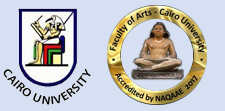عنوان المقال عربي
الخلود الافتراضى والتفرد التكنولوجى فى أوديسا الفناء والخلود لأحمد الصادق
Document Type
Original Study
Keywords English
Transhumanism, Cyborg, Apocalyptic AI, cyber immortality, Technological Singularity
كلمات مفتاحية عربي
مابعد الإنسانية, سايبورغ, الذكاء الاصطناعى التنبؤى, الخلود الالكترونى, التفرد الالكترونى
Abstract English
AbstractModern age’s persistent drive for both human enhancement and immortality has become an obsessive preoccupation of different sciences and disciplines. The issue has consequently become an equally predominant theme in literature. Inspired by this prevailing current tendency, the research critically identifies two types of immortality: biological versus Cyber artificial immortality. The paper highlights Apocalyptic AI and transhumanism as major participant movements of human enhancement and highlights related concepts like cyborg, cyber immortality and techno-theology. It provides a considerable space for the unavoidable consequences of human enhancement through technology and AI focusing on the risk put on Man’s set of religious beliefs that are bound to lose their spirituality to be technologized. It highlights a potential consequent hermeneutic of theology that reconsiders the concept of God, religion, spiritual notions like heaven, immortality, salvation and the evolution of a technological spirituality in place of a secular one. The paper proposes a hybrid approach that builds heavily on the philosophical theory of transhumanism and emphasizes the influence of Apocalyptic AI on transhumanism’s developed form of techno-theology and the possibility of leading humanity to a catastrophic apocalypse. The paper attempts a thorough reading of Ahmed Alsadik’s Hedra: The Odyssey of mortality and Immortality (Hedra:Odesa El Fanaa we Alkholoud) in light of its recommended approach. It seeks to highlight how the novel delineates a world where humans become immortal and subsequently poses some enquiries concerning the validity of cyber artificial immortality, technological singularity and the new evolving techno-theology.
الملخص العربي
مستخلصلقد صارت الرغبة الملحة للبشر فى تحقيق الخلود هى مطلبا عصريا وبؤرة اهتمام الكثير من العلوم وقد انتقل هذا الاهتمام بتعزيز صفات الانسان من خلال العلم والتكنولوجيا ليصبح خالدا إلى الأدب بأشكاله المختلفة فعبر عنه الكثير من الكتاب الذين عكسوا فكرة الخلود الالكترونى وتبعاتها التى تقع على عاتق الانسانية كلها. وفى ضوء هذا استلهم البحث فكرته الأساسية ووضع إطاره النظرى معتمدا على نظرية ما بعد الإنسانية التى استوحت كثيرا من أفكارها من الذكاء الاصطناعى التنبؤى ونظريته فى الخلود التكنولوجى أو الافتراضى وتحول الانسان إلى آلة ذكية تحفظه من الزوال وتتيح له مهارات التفكير ذات الكفاءة العالية والذكاء الآلى الذى يفوق الذكاء البشرى ويتيح للبشر حياة التقدم والرفاهية لكن الذكاء الاصطناعى التنبؤى لم يغفل ما قد يطرأ من متغيرات على فكرة الدين والإله فى ظل هذا التحول والخلود التكنولوجى. استلهمت الحركة الفلسفية المعروفة بما بعد الإنسانية أفكارها من الذكاء الاصطناعى التنبؤى وقدمت تصورا مشابها للخلود الانسانى الافتراضى واعتبرت هذه الحركة بمثابة الديانة التكنولوجية التى تستلهم قوتها من العلم والتكنولوجيا. فى ظل هذه الأفكار يعمد البحث لتحليل رواية أحمد الصادق "هيدرا: أوديسا الفناء والخلود" طارحا بعض التساؤلات بخصوص إحتمالية إنتهاء الجنس البشرى تماما نتيجة لهذا الزحف الالكترونى وما يصاحبه من إختلال فى النظام الهرمى للمخلوقات والكائنات البشرية.
Recommended Citation
(2023)
"Virtual Immortality and Technological Singularity in Ahmed Alsadik’s Hedra: The Odyssey of Mortality and Immortality,"
Journal of the Faculty of Arts (JFA): Vol. 83:
Iss.
4, Article 21.
DOI: 10.21608/jarts.2023.202020.1346
Available at:
https://jfa.cu.edu.eg/journal/vol83/iss4/21
Digital Object Identifier (DOI)
10.21608/jarts.2023.202020.1346
Accept Date
2023-05-22
Publication Date
10-1-2023

